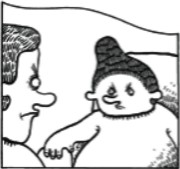|
Some alt-right guys talk about a proto-Indo European bunch of wandering warriors called a koryos, which is where the Spartan krypteia and Norse berserkers come from. The basic idea seems reasonable, and there's a wiki page so there must be a grain of truth, but that's a helluva stretch. How legit/accepted is the idea?
|
|
|
|

|
| # ? May 25, 2024 20:39 |
|
Honestly, I have to admire the tiny pockets of Greek still hanging on ten centuries later.
|
|
|
|
PittTheElder posted:Honestly, I have to admire the tiny pockets of Greek still hanging on ten centuries later.
|
|
|
|
Safety Biscuits posted:Some alt-right guys talk about a proto-Indo European bunch of wandering warriors called a koryos, which is where the Spartan krypteia and Norse berserkers come from. The basic idea seems reasonable, and there's a wiki page so there must be a grain of truth, but that's a helluva stretch. How legit/accepted is the idea? wikipedia posted:Greek tradition Looks like it's not too crazy, though, obviously there's a lot of room to 'over interpret' as the alt-right is prone to do. There's also plenty of cognates in various languages: wikipedia posted:Etymology and name
|
|
|
|
Mandoric posted:Relatedly, it's not quite true that the peasantry got them all at once; there was a subaltern system of unofficial (except for certain purposed like "trademarked" services and village administration) familial pseudo-cognomen that persisted through at least the Shogunate. These, as unofficial things, were very fluid and didn't really survive "was a second son" or "moved away from the bridge" or even "had a few bad business years in a row" before they started to be part of official government records, which probably contributes a lot to the variety. The peasantry more-or-less got surnames all at once in the Philippines, where the Spanish governor prepared a book of acceptable names and told families to choose from them.
|
|
|
|
echopapa posted:The peasantry more-or-less got surnames all at once in the Philippines, where the Spanish governor prepared a book of acceptable names and told families to choose from them. Huh! Didn't know that, that's pretty fascinating.
|
|
|
|
And all this time I thought Spaniards just really knew how to gently caress.
|
|
|
|
I've never bought any of this "theoretical etymology" based stuff. There's always so many tenuous jumps of different-sounding words obviously being from the same - pure theoretical - root, which somehow proves that very disparate groups with no evidence of connection are directly descended from an imaginary neolithic warrior society because they share the trait of "young men doing violence".
|
|
|
|
There have been a number of examples of proposed theoretical constructions that were later verified via epigraphic sources and the like, so it's definitely not all bullshit. David Anthony in the much-loved-here work "The Horse, The Wheel, and Language" about proto Indo-European origins spends a bunch of time reinforcing the argument.
|
|
|
|
What's the earliest recorded event mentioned in history? By that, what I mean is, when it comes to the earliest writings we have, do any of them mention events that would have happened in prehistory? Did any of the earliest civilisations have a cultural memory of something that happened before they settled down and figured out the whole "writing things down" thing? I suppose mythology would be the closest thing.
|
|
|
|
echopapa posted:The peasantry more-or-less got surnames all at once in the Philippines, where the Spanish governor prepared a book of acceptable names and told families to choose from them. Now I'm kind of curious if they tried to get people to go from zero to two surnames right away. I'm assuming they wanted Filipino names to function like Spanish names where people keep one last name from each of their parents, so do you tell people to pick two names right away? Or do you start people with one name even though everyone should be on two names by the next generation?
|
|
|
|
two fish posted:What's the earliest recorded event mentioned in history? By that, what I mean is, when it comes to the earliest writings we have, do any of them mention events that would have happened in prehistory? Did any of the earliest civilisations have a cultural memory of something that happened before they settled down and figured out the whole "writing things down" thing? I suppose mythology would be the closest thing. Every community had an epic poet/historian, whose job was to remember and tell the history of the community through reciting poems and singing songs at gatherings. Some of these were eventually put into writing. They reflect ancient events, but aren't necessarily accurate after centuries of elaboration and embellishment. The Iliad is an example, as is the Biblical Exodus. There are lots more if you go looking.
|
|
|
|
two fish posted:What's the earliest recorded event mentioned in history? By that, what I mean is, when it comes to the earliest writings we have, do any of them mention events that would have happened in prehistory? Did any of the earliest civilisations have a cultural memory of something that happened before they settled down and figured out the whole "writing things down" thing? I suppose mythology would be the closest thing. Depends on what you count as "recorded". There are cave paintings in Australia dated to be ca. 36000 years old. The scenes they are depicting are easily events that are recorded in history. Not very accurate or reliable, but certainly a record of something. If we count Neanderthal-cave paintings, the earliest recorded events weren't even the earliest events recorded in Human history. Libluini fucked around with this message at 17:55 on Aug 19, 2023 |
|
|
|
That time Thog dropped that Wooly Rhino with one spear thrust was pretty epic.
|
|
|
|
Native Australians have oral histories that date back like 50k years or something.
|
|
|
|
two fish posted:What's the earliest recorded event mentioned in history? By that, what I mean is, when it comes to the earliest writings we have, do any of them mention events that would have happened in prehistory? Did any of the earliest civilisations have a cultural memory of something that happened before they settled down and figured out the whole "writing things down" thing? I suppose mythology would be the closest thing. I don't really know the answer to your question (but it'll be in Ancient Egypt because that's where the writing is the oldest), but definitely if we have a written record describing it is history (or proto-history if it's a literate culture describing another culture that has not adopted writing) and not pre-history. Where it gets messy is the legend vs. things that actually happened boundary. The Trojan War as described in the Iliad almost certainly did not occur as the poem suggests (in that Paris, Hector, Helen, Agamemnon, Achilles et. al. weren't real people) but the archaeological evidence does suggest that Achaean Greeks might have been involved in conflicts and the destruction of "Troy" in Western Anatolia. But yeah Australian and North American indigenous people have strong oral history roots, and the Shang dynasty in China was first written about a thousand years later and was considered questionable, but was verified as existing in some form in the early 20th Century. PittTheElder fucked around with this message at 18:19 on Aug 19, 2023 |
|
|
|
Hippocrass posted:Looks like it's not too crazy, though, obviously there's a lot of room to 'over interpret' as the alt-right is prone to do. Lol that Wikipedia article has the smell of original research. It's hard to tell, since it cites about 50 books that aren't going to be easily available online, but my gut feel is that it's pieced together from some very tenuous links in the actual literature. Like, good going whichever of you is CohenTheBohemian for starting to call out some of the issues. But also, Wikipedia has a policy against including new syntheses of facts, which I think is the fundamental issue.
|
|
|
|
PittTheElder posted:Where it gets messy is the legend vs. things that actually happened boundary. The Trojan War as described in the Iliad almost certainly did not occur as the poem suggests (in that Paris, Hector, Helen, Agamemnon, Achilles et. al. weren't real people) but the archaeological evidence does suggest that Achaean Greeks might have been involved in conflicts and the destruction of "Troy" in Western Anatolia. It is the textual evidence that suggests this—the Homeric cycle in combination with Hittite documentation like the Tawagalawa Letter (which doesn’t really agree with the Homeric cycle in any detail, as you would expect documents in different languages and scripts from different cultures centuries apart to not really agree, but does at least suggest that Hittites were concerned about Achaeans causing trouble in northwestern Anatolian at a time before the Greek Dark Age). Archaeological evidence on its own would not suggest that pre-dark age Greeks invaded Anatolia and sacked Troy (and it is far from clear which layer of the Troy site, if any, is to be related to the legend of Trojan war). the archaeological discoveries at Troy were based originally on the desire to find an ancient city more or less where the Greek textual tradition says Troy should be. It’s not the other way around—if not for the Greek text, not only would nobody have gone looking for a city there in the first place, but there would be hardly any reason at all, just from what has been dug up, to say “oh yeah Greeks sacked this place”.
|
|
|
|
skasion posted:It is the textual evidence that suggests this—the Homeric cycle in combination with Hittite documentation like the Tawagalawa Letter (which doesn’t really agree with the Homeric cycle in any detail, as you would expect documents in different languages and scripts from different cultures centuries apart to not really agree, but does at least suggest that Hittites were concerned about Achaeans causing trouble in northwestern Anatolian at a time before the Greek Dark Age). Archaeological evidence on its own would not suggest that pre-dark age Greeks invaded Anatolia and sacked Troy (and it is far from clear which layer of the Troy site, if any, is to be related to the legend of Trojan war). the archaeological discoveries at Troy were based originally on the desire to find an ancient city more or less where the Greek textual tradition says Troy should be. It’s not the other way around—if not for the Greek text, not only would nobody have gone looking for a city there in the first place, but there would be hardly any reason at all, just from what has been dug up, to say “oh yeah Greeks sacked this place”. I’m assuming they think the Greeks sacked the place due to the proliferation of tiny dick art all over the walls with fire damage?
|
|
|
mossyfisk posted:I've never bought any of this "theoretical etymology" based stuff. There's always so many tenuous jumps of different-sounding words obviously being from the same - pure theoretical - root, which somehow proves that very disparate groups with no evidence of connection are directly descended from an imaginary neolithic warrior society because they share the trait of "young men doing violence".
|
|
|
|
|
Nessus posted:Are you talking about proto-Indo-European or something else? I thought PIE had a lot of evidence behind it, it's just that yeah, it's not the ur-language, it was a sort of linguistic common ancestor for a lot of languages in Eurasia, including a couple of the far Western descendants which then got lucky and jumped the Atlantic. I think the post was attacking the idea of vague linguistic similarities being used as the basic to hypothesize a ten-thousand-year secret pan-Indo-European warrior society, as in that dubious Wikipedia article.
|
|
|
|
the ten thousand year pan-indo-european warrior society was the little-known third participant in the finno-korean hyperwar
|
|
|
|
|
I just read that wiki article and lol. PIE roots are theoretical reconstructions based ultimately on phonological and structural methods. Which can be sound or unsound in themselves and there is scholarly debate about how best to employ them—but anyway, beware anytime you see one of these roots not accompanied by asterisk: it means someone is trying to will their idea into being. Libluini posted:If we count Neanderthal-cave paintings, the earliest recorded events weren't even the earliest events recorded in Human history. Neanderthals are humans though. Their history is ours. There is a nonzero chance that Neanderthal biochemistry is replicated somewhere in your human body right now.
|
|
|
|
euphronius posted:This is probably part of it Except France was also that an now occitan is a pretend language you put on some street signs to pretend being nice
|
|
|
|
 Hmm, I wonder what most of these "scholars" had in common.
|
|
|
|
Scarodactyl posted:
Surprisingly, only two of them were Germans; most of them were Austrians. Which isn't any better in this context, of course; the article itself notes that "these theories influenced German Völkisch movements in the period 1900–1920s, then Nazi circles during the 1930–1940s" and that "scholarship from the later part of the 20th century has pointed out the far-right ideological foundations of most of the earlier works," but also claims that this late-20th-century scholarship "has also yielded new evidence supporting the existence of such brotherhoods of warriors in early Germanic and other Indo-European cultures."
|
|
|
|
Aside from Schurtz who died in 1902 but the Nazis loved for all the reasons you'd expect, of the remaining eight three were explicit nazis and three others were not but had no problem working with the above three in developing this particular idea. Leaving Stumfl who may not have been an explicit Nazi (he died in 1938) but was within their scholarly orbit and wrote poo poo like "Unsere Kampf um ein deutsches Nationaltheater", and Jeanmaire who is french and I didn't bother to research further. Point is this list looks to be a core group of hardcore nazis and their various collaborators.
|
|
|
|
Scarodactyl posted:L, and Jeanmaire who is french and I didn't bother to research further. A lot of the early blood and earth bullshit in German nationalist circles was influenced by similar poo poo coming out of France, so that might not be the dry hole you think it is. edit 3: this isn't to say that Germany didn't organically develop that crap on their own too, but like all intellectual traditions there's some back and forth and exchanging of ideas across international borders. edit: Maurice Barres is the one everyone always points to, but it goes a bit older than that. Joseph de Maistre, for example, was an early counter-enlightenment/romanticist writer who emphasized the importance of "natural" communities, natural in scare quotes in the sense of traditional people living where their ancestors traditionally lived and doing their traditional jobs in the traditional way and generally being part of a "natural"/organic community. edit 2: in general a lot of proto-Fascism can be found in 19th century France. The French Revolution was profoundly scarring for the cultural and economic elites, and they swung hard to the right in part because of that, and then Prussia kicking their asses in 1870 opened up a lot of room for people to naval gaze about what was wrong with their country. Barres, for example, gets big into the Dreyfus Affair and writes a bunch of anti-semetic pamphlets that would have been right at home in 1935 Germany. Cyrano4747 fucked around with this message at 21:39 on Aug 19, 2023 |
|
|
|
Offler posted:Now I'm kind of curious if they tried to get people to go from zero to two surnames right away. I'm assuming they wanted Filipino names to function like Spanish names where people keep one last name from each of their parents, so do you tell people to pick two names right away? Or do you start people with one name even though everyone should be on two names by the next generation? Filipino names don't quite work like they do in Spain. The mother's name that in Spain would be the second last name is called the "middle name" and in most cases when women marry, their middle name changes. The most confusing part of it is that they call the second last name a middle name, which of course has a completely different meaning in most English speaking countries
|
|
|
|
two fish posted:What's the earliest recorded event mentioned in history? By that, what I mean is, when it comes to the earliest writings we have, do any of them mention events that would have happened in prehistory? Did any of the earliest civilisations have a cultural memory of something that happened before they settled down and figured out the whole "writing things down" thing? I suppose mythology would be the closest thing. The earliest writings we have are not really concerned with mythology or history. The earliest writings come from Southern Iraq, around 3300 BC, followed closely by similar writing in Southwestern Iran a little bit later, followed a few centuries later by Hieroglyphic writing in Egypt. From around 3300 BC to around 2600 BC, the surviving writings from Iraq and Iran are exclusively from two categories of texts, administrative records (over 90% of surviving texts from this period), and lexical lists (less than 10% of texts from this period). The administrative records from Iraq and Iran are very narrow in scope. They are relatively short, and the writing system they use is very abbreviated, meaning they don't provide us much extraneous or incidental information. Generally, they only record administrative information for a few years of time at most. There are events in these tablets, for example a set of 18 tablets associated with an administrator named Kushim from c. 3100 BC record the collection of 135,000 liters of barley and the distribution of rations for 1800 people. Those are both events, but they aren't going to tell you much about society before they "settled down." These kinds of texts are quite valuable for studying the period immediately preceding the development of writing in the region, but in Iraq and Iran that is still a highly urbanized, "settled" society. The city of Uruk, where many of the earliest written texts in the world are from, had a population of c. 40,000 in c. 3700 BC, and the written texts from a few centuries later are quite helpful in studying the centuries before c. 3300 BC.
|
|
|
|
Libluini posted:Depends on what you count as "recorded". There are cave paintings in Australia dated to be ca. 36000 years old. The scenes they are depicting are easily events that are recorded in history. Not very accurate or reliable, but certainly a record of something. This was my first thought. A 19th century German anthropologist recorded indigenous oral traditions about how palm trees wound up in the Northern Territory which DNA evidence backs. http://nationalunitygovernment.org/...%20years%20ago.
|
|
|
|
I don't see anything particularly impossible about some of the Proto-Indo-European groups having initiation rituals for young warriors that could be accurately described using the term "koryos" as it's described in that Wikipedia article. But the way whoever wrote that article tries to tie that concept into so many drat things is, I think, next door to folklorist garbage like pagan survivals and Jungian archetypes.
|
|
|
|
Big Willy Style posted:This was my first thought. A 19th century German anthropologist recorded indigenous oral traditions about how palm trees wound up in the Northern Territory which DNA evidence backs. I worry I'm too negative on this; I'll say it would definitely be cool as heck if turns out some oral traditions really are that old. But, while they don't show the actual original myth, which maybe helps elaborate on the claim, what they quote: quote:Professor Bowman read an Aboriginal legend recorded in 1894 by pioneering German anthropologist and missionary Carl Strehlow, which was only recently translated, describing the "gods from the north" bringing the seeds to Palm Valley. Just sounds... like a totally generic turn of phrase that could have come from any number of origin myths, and by pure coincidence can be interpreted as fitting genetic evidence. I know some indigenous Australian peoples have demonstrated remarkably stable oral traditions, but I feel like (because of that) a bunch of people have become very invested in turning what's an impressive aspect of those cultures into something just implausably enduring. There is so, so much evidence on the fallability of human memory and on how oral accounts change over time. The ice age -- let alone tens of thousands of years before the last one even ended -- is just too infathomably long ago.
|
|
|
|
Cyrano4747 posted:for people to naval gaze Hence the jeune ecole I presume
|
|
|
|
Name talk continues: in Micronesia, families that didn’t have surnames as of World War II often took on the first names of American soldiers they’d befriended. Common surnames include Fred, Billy, and Jack.
|
|
|
|
Tunicate posted:Caesar's Palace now has daily gladitorial combat matches, and no matter how cool Roman gladiators were, they didn't have flamethrowers or blades apinning at 300 mph The point of ancient gladiators was not cool weapons, it was watching people die, rather than smashing bits of disposable equipment together. more to the point: generally ancient elites really enjoyed using and being served by people, and very few ancient aristocrats would take up a job as a computer toucher where they have to follow orders, deal woth bureaucracy, pay rent, and not assault or rape anyone just for A/C, antibiotics, and chicken tendies. They had less than zero respect for work and the values of a modern society, and would consider salaried employees little better than slaves no matter how many gadgets they owned. E: and nobody in modern society, of any class, would tolerate an ancient aristocrat either. Think the worst of  and and  combined, but even worse--and far more violent. combined, but even worse--and far more violent.
Woolie Wool fucked around with this message at 17:43 on Aug 22, 2023 |
|
|
|
Woolie Wool posted:The point of ancient gladiators was not cool weapons, it was watching people die, rather than smashing bits of disposable equipment together. They were all about cool weapons, spectacle, and putting on a show, the stereotypical trident+net gladiator equipment is because a gimmick Fish Vs Fishermen match ended up becoming ridiculously popular to watch and kept coming back.
|
|
|
|
Modern wrestling except incidental death and injury were far more common and intentional death matches were w thing arranged.
|
|
|
|
Yeah actual professional gladiators had a pretty good survival rate, but if you were a criminal, captured enemy, or ostrich you were hosed.
|
|
|
|

|
| # ? May 25, 2024 20:39 |
|
I wonder if modern wrestlers or gladiators lived past 49 more more often
|
|
|






 Yes, it's like a lava lamp.
Yes, it's like a lava lamp.











































